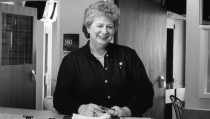I didn’t realize that Joyce Clifford died in October. When I was a student, we practiced primary nursing while the actual staff nurses were all still doing team nursing. It was a tumultuous time. Joyce was truly a visionary and deserves the honor of being a nursing legend.
The following obituary is from The New York Times.
~~

Joyce C. Clifford, a nurse who advocated a partnership of equals between doctors and nurses in the treatment of patients, and whose ideas were adopted in some of the nation’s best hospitals because they reduced medical errors and improved survival rates, died on Oct. 21 in Boston. She was 76.
The cause was heart disease and kidney failure, said her husband, Lawrence.
Dr. Clifford, who received a Ph.D. in health planning from Brandeis University, was part of the first generation of registered nurses who sought to make bachelor’s degrees a minimum requirement in a field where most held associate degrees. It was a requirement she set for all the nurses she hired at Beth Israel Hospital in Boston, a Harvard teaching hospital, where she worked from 1974 until 1999 as the nursing administrator and later vice president.
Under the “primary nursing” model she introduced in 1975 at Beth Israel, nurses were assigned primary responsibility for four or five patients — caring for each while on duty, being on call when off duty, and acting as an advocate and intermediary with each patient’s doctors.
The idea was to restore the continuity and accountability that were considered casualties of the nursing system then widely in use, known as team nursing. In the team system each nurse had a specialized task, like dressing wounds or managing medication, but no single nurse had a glimpse of the big picture.
“Doctors see a patient for a couple of minutes a day, but nurses are there 24/7,” Margaret Grey, dean of the Yale School of Nursing, said in an interview after Dr. Clifford’s death. “Joyce Clifford put together a system that gave the primary nurse the benefit” of that accumulated round-the-clock nursing information, she said.
Dr. Clifford was not the creator of the primary nursing model, but she was probably the first to put it into practice in a large teaching hospital, said Linda Aiken, director of the Center for Health Outcomes and Policy Research at the University of Pennsylvania, who published research about the work of Dr. Clifford.
Studies showed that the system was good for patients and for hospitals, Professor Aiken added. The increased accountability and higher level of education it demanded were linked to a decline in patient mortality and a lower turnover of nurse staff.
“Beth Israel had a waiting list of applicants,” Professor Aiken said, “even when there were nurse shortages everywhere else.”
Primary nursing has never become the norm. Only about 10 percent of the nation’s hospitals use it in one form or other. In the face of corporate mergers and cost-cutting, some hospitals where it was once in practice — including Beth Israel, now known as theBeth Israel Deaconess Medical Center — have since modified or eliminated it in favor of more decentralized systems.
Dr. Clifford’s achievement was in showing how primary nursing could work, said Dana Beth Weinberg, an assistant sociology professor at Queens College. Professor Weinberg’s Harvard dissertation, published in 2003 as the book “Code Green: Money-Driven Hospitals and the Dismantling of Nursing,” chronicled the dismantling of primary nursing at Beth Israel after its merger with Deaconess Medical Center in 1999 and Dr. Clifford’s departure.
Dr. Clifford went on to found and lead the Institute for Nursing Healthcare Leadership, which promotes research and advanced education in nursing and the primary nurse system.
She was born Joyce Catherine Hoyt in New Haven on Sept. 12, 1935, one of four daughters of Raymond Hoyt, an ironworker, and his wife, Helen. She received a nursing diploma from St. Raphael Hospital in New Haven and a bachelor of science degree in 1959 from St. Anselm College in New Hampshire.
She joined the Air Force in the early 1960s and received a master’s degree in nursing administration in 1968 from the University of Alabama in Birmingham, where she was stationed.
She and her husband met at the university. Besides Mr. Clifford, she is survived by a sister, Rita Brown, of West Haven, Conn.
Dr. Clifford was hired as Beth Israel’s chief nurse by its president and chief executive, Dr. Mitchell T. Rabkin, a member of the Harvard Medical School faculty.
Dr. Rabkin said Monday in an interview that he had had an insight when he was a young intern. “On my very first day of internship,” he said, “I realized that nurses knew a hell of a lot more than I did.”
Dr. Rabkin gave Dr. Clifford carte blanche to put together a nursing staff that would work collaboratively with doctors. There was some resistance at first. Medical doctors complained that instead of talking to one nurse about the patients in a section of a ward, say, they had to contact each patient’s primary nurse, which meant making a number of separate contacts.
“The resistance did not last long,” Dr. Rabkin said. “Because the doctors soon realized that they were getting far better information, and the patients were getting better care.”


Leave a Reply to LeslieCancel reply